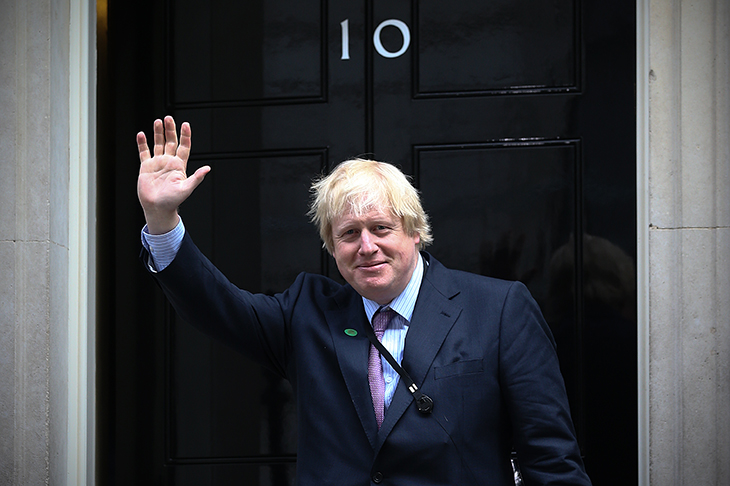British prime ministers are never more powerful than just before a cabinet reshuffle. Ministers fall over themselves to be helpful, hoping to secure their position or move up the pecking order. Backbenchers start hailing the prime minister’s every decision as an act of firm and enlightened leadership. This spectacle is underway ahead of next month’s well-trailed reshuffle, which has already been dubbed the ‘Valentine’s Day Massacre’ by Whitehall wags.
It is not just the reshuffle that is propelling Boris Johnson towards the peak of his political powers. He has an 80-seat majority at his back. And with all the talk of reform, government departments are similarly keen to demonstrate their worth to No. 10.
This new, more obliging approach was on full display at cabinet on Tuesday. When Theresa May was home secretary and Ken Clarke was justice secretary, she used to joke that she ‘locked them up and he let ’em out’. There was a truth behind this gag; an institutional tension existed between the two departments. But at this week’s cabinet, their successors, Priti Patel and Robert Buckland, were in harmony as they discussed how to cut violent crime — which Buckland described as ‘basic hygiene’ for a Tory government.
The discussion that followed was more substantial than most cabinet discussions. Nicky Morgan, the culture secretary, pointed out that the most common time for knife crime to be committed is between 4 p.m. and 6 p.m. In other words, this is a problem to do with the young rather than an issue that needs more late-night policing.
Sajid Javid, who since the election has shown an ability to anticipate what No. 10 is going to want and propose it himself, then suggested that there should be a Cobra-style committee to help deliver on this policy. Johnson embraced the idea, saying that if the government was to achieve the 20 percent cut in violent crime that he wanted, every department was going to have to be involved. He then said that he would personally chair the committee, with Patel as the deputy. He would be on the lookout for any policies which might have been influenced by ‘lefty criminologists’, and would also review the role of elected police and crime commissioners. It was a sign of how he intends to set ambitious targets to try to focus minds.
The cabinet meeting illustrated why the reshuffle might end up being less radical than expected: the PM is already getting what he wants without having to make sweeping changes. Take his plan, revealed to The Spectator last month, to rewrite Treasury spending rules to allow more infrastructure spending outside London and the south-east. Once, such a plan might have met stiff resistance. Not now (perhaps partly because of rumors that No. 10 is planning a new economics department to rival the Treasury).
Instead, the Treasury and Javid have been busy making the case that they know how to deliver on the prime minister’s ‘leveling up’ agenda. The chancellor and the Treasury want to show No. 10 that there’s no need for either a new chancellor or a new economics department.
Under Javid, the Treasury has quickly adjusted to the new reality of a prime minister who is the undisputed king of Whitehall. Gordon Brown used to try and keep the Budget secret from Tony Blair until the night before its delivery. By contrast, Javid and Johnson are meeting every Monday to discuss measures for the March 11 Budget, with another meeting midweek to see what progress has been made.
Various secretaries of state have followed Javid’s lead and made sure that No. 10 knows that they are on board with the PM’s agenda for their departments. Others have saved themselves by their own exertions. Julian Smith, the Northern Ireland secretary, had several dingdongs with No. 10 in the early months of Boris’s premiership about no-deal planning and Northern Ireland. But his achievement in getting Stormont back up and running has impressed Johnson and secured his position. I understand that Johnson began cabinet this week with an effusive tribute to Smith’s work, even though the Northern Ireland secretary wasn’t actually present to hear it.
There will still be moves in this reshuffle. But the new spirit of obedience, combined with the fairly radical changes made when Johnson first picked the cabinet last summer, means it will be more Midsomer Murders than Valentine’s Day Massacre.
The changes to the machinery of government will not be as drastic as some had expected either. There are two reasons for this. The first is that Johnson’s determination not to extend the Brexit transition period beyond December means that changes in the UK’s relationship with the EU will be implemented from the beginning of next year. Given this, the most pressing priority is to prepare for the new customs and immigration regimes rather than to create a new borders department, even if in the long-term putting customs and immigration under one roof makes sense.
The second reason is that political aides in No. 10 were taken aback to return at the start of the year to find that the civil service was pulling together a team of some of the most able officials in Whitehall to handle the machinery of any government changes. It was a reminder of just how much energy would have been taken up by large-scale changes to departmental responsibilities.
Today, Johnson is in a more powerful position than any British prime minister since Tony Blair prior to the invasion of Iraq. Brexit day on January 31 will give him a further boost. With Labour without a leader until April and with no internal opposition in government, these are his golden weeks; the time to advance his agenda both at home and during negotiations with the EU.
This article was originally published in The Spectator’s UK magazine. Subscribe to the US edition here.



















